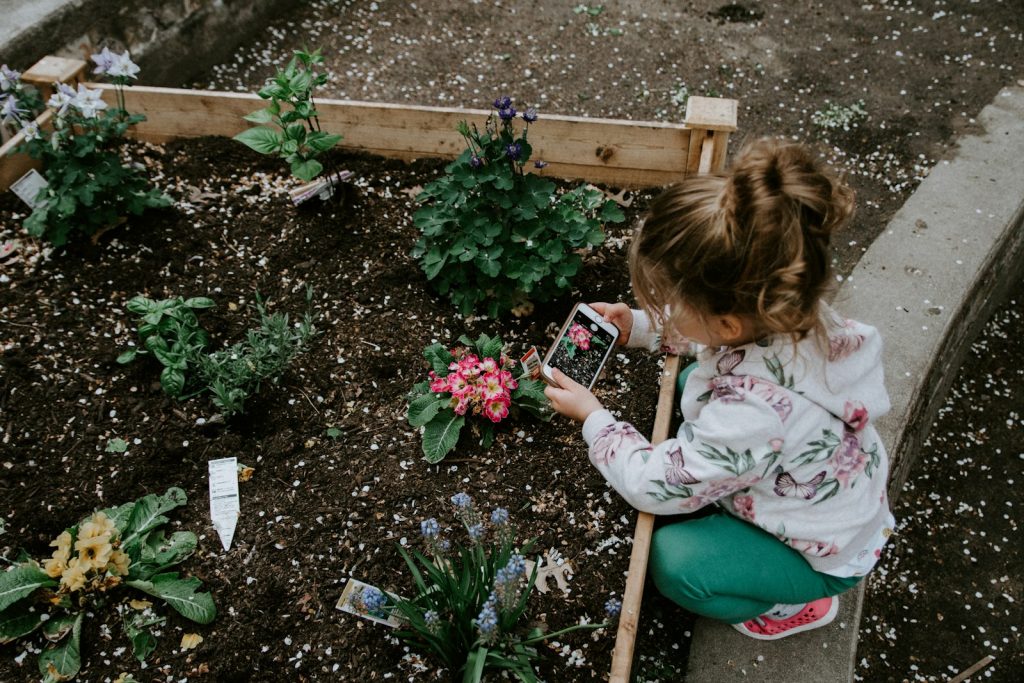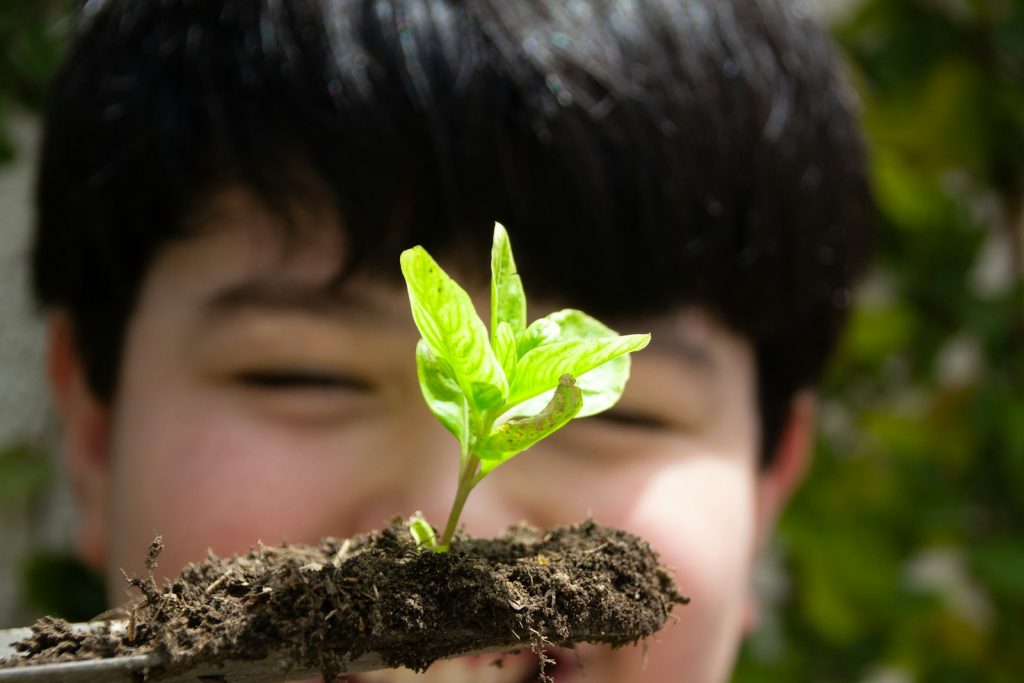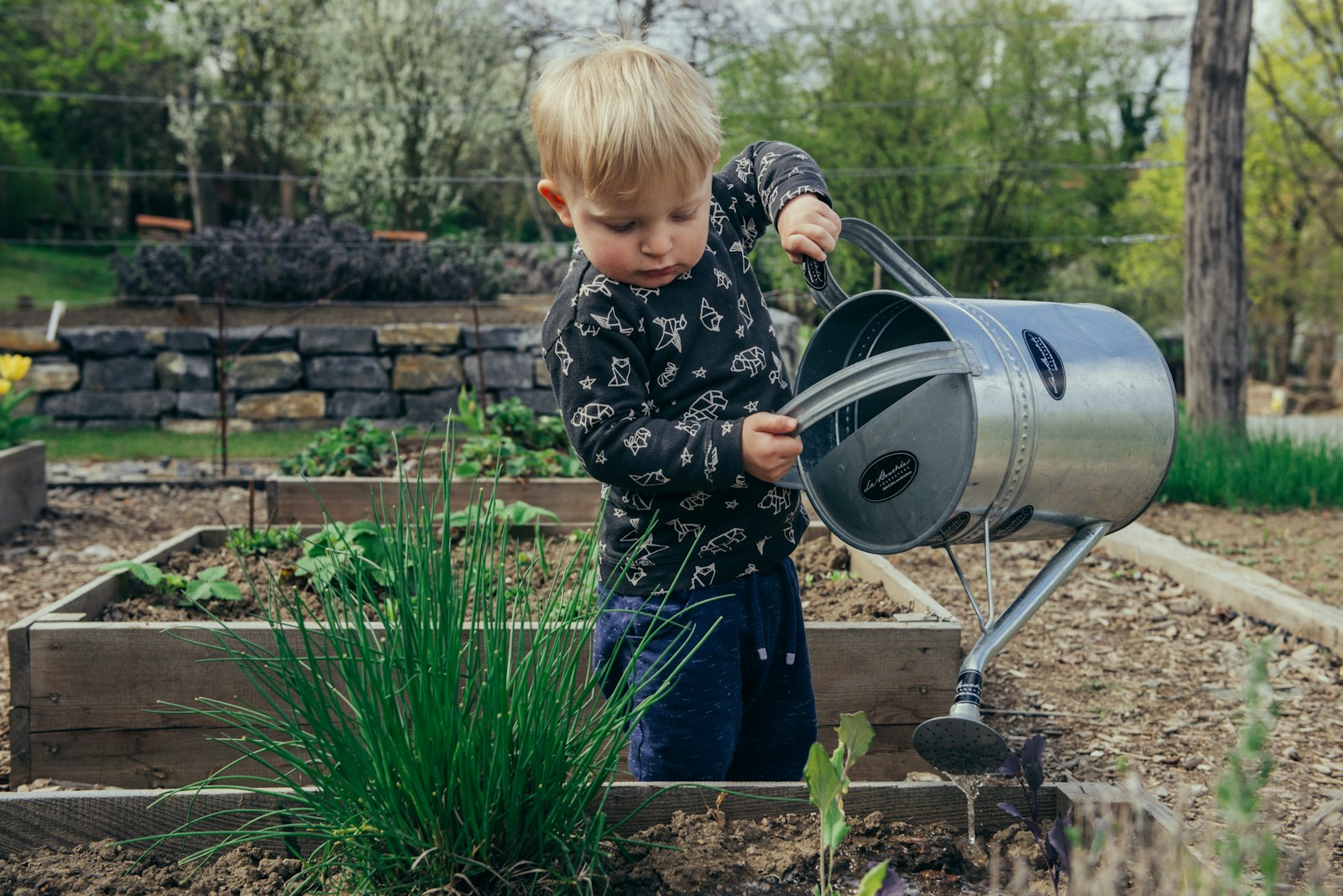Introduction: Organic Gardening for Kids
Imagine the excitement on your child’s face as they witness the first sprout emerge from the soil, or the pure joy of harvesting their vibrant vegetables and fragrant herbs. Organic gardening with kids is a fun and educational activity and a gateway to instilling a deep appreciation for nature and sustainable living.
In today’s fast-paced world, where children are often glued to screens and disconnected from the natural world, introducing them to organic gardening can be a refreshing and rewarding experience. By getting their hands dirty and witnessing the magic of plants growing from seed to harvest, kids develop a profound connection with the earth and better understand where their food comes from.
Engaging children in organic gardening also promotes healthy eating habits, as they are more likely to try and enjoy their labor’s fruits (and veggies!). Additionally, gardening provides numerous benefits for a child’s physical, cognitive, and emotional development, making it a valuable and enriching activity for their overall well-being.
So, let’s embark on this exciting journey together, where your little ones can explore the wonders of nature, cultivate a love for organic gardening, and sow the seeds of a lifelong passion for sustainability.
Benefits of Organic Gardening for Kids

Introducing children to organic gardening offers a multitude of benefits that extend far beyond simply growing plants. Here are some of the most notable advantages:
- Promotes Physical Activity: Gardening involves various physical tasks, such as digging, raking, and carrying, which help children stay active and develop motor skills.
- Fosters Responsibility and Patience: Caring for plants requires consistent effort and attention, teaching children valuable lessons in responsibility and patience as they witness growth and changes.
- Enhances Cognitive Development: Gardening activities engage children’s senses and encourage observation, problem-solving, and critical thinking skills, supporting their cognitive growth.
- Improves Environmental Awareness: Children develop a deeper appreciation for the environment and their role in preserving it by learning about organic practices and the importance of sustainability.
- Boosts Confidence and Self-Esteem: The sense of accomplishment and pride from nurturing plants and harvesting their produce can greatly enhance a child’s self-confidence and self-esteem.
- Encourages Healthy Eating Habits: Children are more likely to try and enjoy fresh produce when they’ve had a hand in growing it, fostering healthy eating habits from an early age.
- Provides a Calming and Therapeutic Activity: Gardening can be a peaceful and grounding experience, offering children a respite from the stresses of daily life and a chance to connect with nature.
By incorporating organic gardening into your child’s life, you cultivate their love for nature and nurture their overall well-being and personal growth.
Getting Started: Choosing the Right Plants and Supplies
To ensure a successful and enjoyable gardening experience for your child, choosing the right plants and gathering the necessary supplies is essential. Here are some tips to get you started:
Selecting Kid-Friendly Plants
- Fast-Growing Vegetables: Children often have shorter attention spans, so they opt for vegetables that grow quickly, such as radishes, lettuce, and cherry tomatoes. Seeing the results of their efforts promptly will keep them engaged and motivated.
- Eye-Catching Flowers: Vibrant and unique flowers like sunflowers, marigolds, and zinnias can captivate a child’s interest and make the gardening experience more visually appealing.
- Herbs: Herbs like basil, mint, and cilantro are not only easy to grow but also offer fragrant and flavorful additions to homemade dishes, encouraging kids to explore new tastes.
- Fun and Unusual Plants: Consider growing unique plants like rainbow carrots, striped tomatoes, or tiny pumpkins to pique their curiosity and make the gardening experience more exciting.
Essential Gardening Supplies
- Child-Sized Tools: Invest in kid-friendly gardening tools, such as small shovels, rakes, and watering cans, to make the tasks more manageable and enjoyable for little hands.
- Gloves and Kneeling Pads: Protect your child’s hands and knees with comfortable gloves and kneeling pads, ensuring a comfortable and safe gardening experience.
- Seed Starting Supplies: Include seed trays, potting mix, and labels so that your child can experience the entire growing process from seed to harvest.
- Decorative Touches: Add fun touches like painted plant markers, colorful pots, or garden art to personalize the space and make it more inviting for your child.
- Gardening Books and Apps: Age-appropriate gardening books and educational apps can provide valuable information and engage your child’s interest in learning about plants and organic gardening techniques.
Creating a child-friendly gardening environment with the right plants and supplies will set the stage for an enjoyable and enriching experience that will cultivate a lifelong love for gardening.
Fun Gardening Activities for Kids

Gardening with children should be an enjoyable and engaging experience. Here are some fun activities to incorporate into your organic gardening adventures:
- Seed Planting and Germination Experiment: Allow your child to plant seeds in different containers or conditions and observe how different factors affect germination and growth.
- Garden Scavenger Hunt: Create a list of things to find in the garden, such as different leaf shapes, insects, or specific plants, and make it a fun exploration activity.
- Sensory Exploration: Encourage your child to touch, smell, and observe the different textures, colors, and scents in the garden. This will engage their senses and foster a deeper connection with nature.
- Garden Art and Crafts: Get creative by making plant markers, decorative pots, or garden art using recycled materials or natural elements found in the garden.
- Cooking with Homegrown Produce: Involve your child in the kitchen by using the fresh produce from your garden to prepare healthy and delicious meals or snacks together.
- Garden Journaling: Give your child a gardening journal to record observations, draw pictures, or document the growth of their plants. This will foster a sense of ownership and pride.
- Worm Composting: Set up a worm composting bin and let your child experience the fascinating decomposition and nutrient cycling process.
- Gardening Games and Songs: Incorporate gardening-themed games, songs, or stories to make the experience more engaging and enjoyable for your child.
By incorporating these fun and interactive activities, you’ll capture your child’s imagination and create lasting memories and a deeper connection with the natural world.
Teaching Organic Gardening for Kids Concepts
While gardening with kids is undoubtedly a fun and engaging activity, it also presents valuable opportunities to teach important organic gardening concepts in a hands-on and age-appropriate manner. Here are some key concepts to explore:
- What is Organic Gardening?: Explain the principles of organic gardening, emphasizing the avoidance of synthetic chemicals and the importance of nurturing the soil and ecosystem.
- Soil Health and Composting: Demonstrate how compost and organic matter enrich the soil, providing essential nutrients for plants to thrive. Involve your child in the composting process by collecting and adding organic materials.
- Beneficial Insects and Pest Management: Introduce the concept of beneficial insects, such as ladybugs and lacewings, and how they help control pests naturally. Teach gentle and organic pest management methods, like companion planting or insecticidal soaps.
- Water Conservation: Discuss the importance of responsible water usage and explore techniques like mulching and proper watering schedules to conserve this precious resource.
- Plant Lifecycles: Use the hands-on experience of growing plants from seeds or seedlings to teach your child about the different stages of a plant’s lifecycle, from germination to flowering and fruiting.
- Seed Saving and Plant Propagation: Introduce the concept of seed saving and plant propagation, such as taking cuttings or dividing plants, to promote self-sufficiency and preserve heirloom varieties.
- Biodiversity and Companion Planting: Explain how growing diverse plants and practicing companion planting can create a balanced ecosystem, attract beneficial insects, and deter pests.
- Sustainable Practices: Discuss the broader impact of organic gardening on the environment and how it contributes to a more sustainable future by reducing chemical use and promoting healthy soil and ecosystems.
To make these concepts engaging and accessible, consider using visual aids, hands-on demonstrations, and age-appropriate analogies. Encourage your child to ask questions, share their observations, and actively participate in learning.
Organic Gardening for Kids: Recommended Books and Resources
To further support your child’s interest and education in organic gardening, consider incorporating engaging books and educational resources into your gardening journey. Here are some highly recommended options:
Books for Young Gardeners:
- “Gardening Lab for Kids” by Renata Fossen Brown
- “Roots, Shoots, Buckets & Boots” by Sharon Lovejoy
- “The Curious Gardener’s Almanac” by The Niall Edworthy
- “Gardening for Kids: Learn, Grow, and Get Messy with Fun STEAM Projects ” by Brandy Stone
Gardening as a Family: Bonding and Life Lessons
Organic gardening offers a unique opportunity for family bonding and imparting valuable life lessons. By involving the entire family in the gardening process, you create shared experiences, memories, and a sense of teamwork.
- Quality Time: Gardening provides a chance to unplug from screens and distractions, allowing families to spend quality time together in a peaceful, nurturing environment.
- Teamwork and Collaboration: Assign age-appropriate tasks and responsibilities, encouraging children to work together and contribute to the shared goal of maintaining a thriving garden.
- Patience and Delayed Gratification: Witnessing the growth cycle of plants teaches children the virtues of patience and the rewards of delayed gratification as they learn to care for their plants over time.
- Appreciation for Nature: By nurturing plants and observing the intricate processes of nature, children develop a deeper respect and appreciation for the natural world and the cycles that sustain life.
- Healthy Eating Habits: Involving children in the entire process, from planting to harvesting and cooking, instills a greater appreciation for fresh, nutritious produce and encourages healthy eating habits.
- Environmental Stewardship: Through organic gardening practices, children learn the importance of sustainability, reducing waste, and caring for the environment – lessons that will shape their values and actions as future stewards of the planet.
Gardening as a family creates cherished memories and provides a hands-on learning environment where children can acquire valuable life skills and develop a deeper connection with nature and their food sources.
Conclusion
Organic gardening with kids is a journey that nourishes the mind, body, and soul. By introducing children to the wonders of growing their plants, you’re cultivating a love for nature and sowing the seeds of environmental stewardship, healthy eating habits, and a lifetime of valuable lessons.
As your child’s hands dig into the rich soil, their senses will awaken to the natural world’s vibrant colors, fragrant aromas, and textures. They’ll experience the thrill of watching their first seedlings sprout and the pride of harvesting their fresh produce. These moments of wonder and accomplishment will leave an indelible mark on their childhood and shape their appreciation for the cycles of life.
But organic gardening is more than just a hobby—it’s a gateway to teaching essential concepts about sustainability, biodiversity, and responsible resource management. By involving your child in this rewarding activity, you’re empowering them with knowledge and practical skills that will serve them well throughout their lives.
So, embrace the opportunity to create lasting family memories, foster a deeper connection with nature, and instill valuable life lessons through the joy of organic gardening with your kids. The rewards will be abundant in the bountiful harvests and the lifelong love for the natural world you’ll cultivate together.
Frequently Asked Questions
Q: What is the best age to start gardening with kids?
A: Children as young as 2 or 3 can start participating in simple gardening tasks like watering, planting seeds, and observing plant growth. As they grow older, you can introduce more complex concepts and responsibilities.
Q: How do I keep my child engaged and interested in gardening?
A: Make it fun and interactive by incorporating games, crafts, and sensory activities. Let them choose their favorite plants or decorate their garden space. Celebrate milestones like the first sprout or harvest to maintain their enthusiasm.
Q: What if my child loses interest or gets bored with gardening?
A: It’s natural for children’s interests to fluctuate. Don’t force it; continue to involve them in small tasks and observations. Their curiosity may reignite as they witness the progress and changes in the garden.
Q: Can indoor gardening be an alternative for those with limited outdoor space?
A: Absolutely! Indoor gardening with containers or grow lights can be a great option for those with limited outdoor space. It allows children to experience the joy of growing plants year-round.
Q: How can I make organic gardening with kids more educational?
A: Incorporate hands-on activities, experiments, and age-appropriate resources like books and apps. Discuss concepts like plant lifecycles, ecosystems, and sustainable practices. Encourage observation and journaling to reinforce learning.
Q: Are there any safety precautions to consider when gardening with kids?
A: Teach proper tool handling and supervision, use child-safe gardening tools and gloves, and avoid toxic plants or chemicals. Ensure adequate sun protection and hydration during outdoor activities.
Q: Can organic gardening with kids help develop important life skills?
A: Absolutely! Gardening fosters patience, responsibility, teamwork, and a sense of accomplishment. It also teaches valuable lessons about nurturing living things, sustainability, and the cycles of nature.

Leave a Reply